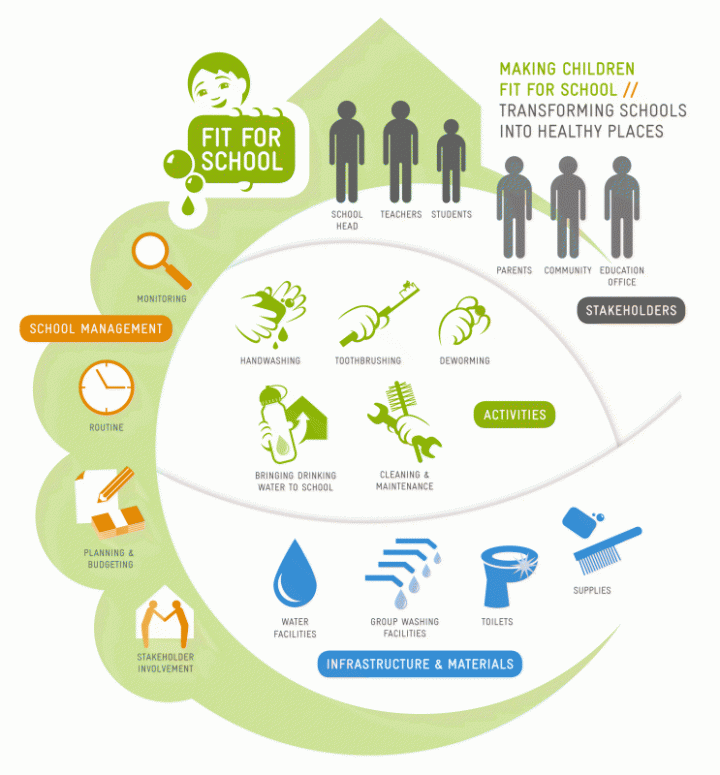Support for Promotion of Fit for School Programmes To use existing structures in the education sector to improve school washing and sanitary facilities
Deutsche Gesellschaft für Internationale Zusammenarbeit (GIZ) GmbH
GIZ
The Regional Fit for School Programme works together with the Southeast Asian Ministries of Education Organization (SEAMEO) and its Regional Center for Educational Innovation and Technology (SEAMEO INNOTECH).
The programme uses existing structures in the education sector to improve school washing and sanitary facilities.
Recognizing the importance of School-based Management, the Fit for School approach strengthens the capacity of the education sector to implement simple evidence-based interventions such as handwashing with soap and toothbrushing with fluoride toothpaste. Promoting these measures as group activities and integrating them into the daily routine of primary schools helps to address some of the most prevalent diseases among schoolchildren.
The approach is based on four core principles: simplicity, sustainability, scalability and system focus.
A WASH in Schools programme and its interventions must be grounded on the best possible evidence and should be cost-effective and simplified to facilitate implementation in the school context with little extra effort.
To ensure sustainability, long-term allocation of government human and financial resources is crucial. Close partnership with the parents and the local community is imperative in maximizing ownership, transparency and accountability.
Capitalizing on existing systems and resources is an essential strategy for scalability and sustainability. The approach works through the education sector, especially at the subnational level, to promote sustainable programme management and implementation within the local structures. Additional payments and monetary incentives are not part of the approach since they often lead to a collapse of activities as soon as the external funding ends.

Mission
Improve the health and academic performance of primary school children in participating countries through the introduction of school health programmes.Results
The Philippine Department of Education’s national school health programme currently targets more than 2.5 million of the country’s 12 million primary school children. Since 2008, it has used the Fit for School approach and has been supported by GIZ. A long-term study initiated in 2009 showed that the programme's measures were having a positive effect on the health of school children after just one year. In schools where the Fit for School approach was implemented, 20 per cent fewer children were underweight, the number of new cases of caries had fallen by 40 per cent, serious worm disorders had halved, and there were 30 per cent fewer illness-related absences than in control schools. An initial impact study conducted in Cambodia, Laos and Indonesia in 2014 showed that the number of new cases of caries among children from schools involved in the programme was 20 per cent lower than that among children from control schools. The programme also helped to greatly improve access to water and sanitary facilities within the school environment. The functioning and cleanliness of school toilets and washing facilities had been significantly improved in the programme schools.Further comments
Elisabeth: why still offline? Shobana on 14 August 2018: I was asked not to turn this online a few months back due to involvement of other partners. I have asked the new intern for fit for school to update the project Edited by Chris on 16 August 2018External Website(s)
https://www.giz.de/en/worldwide/14407.html
Answer questions about the project
Nicole Siegmund
nicole.siegmund@giz.de
Bella Monse
bella.monse@giz.de
Filter / Tags
Technology comparisonsRural areasWASH and nutritionEnabling environment and institutional strengtheningAustralian governmentGerman governmentSchoolsGovernment-owned entity (not university or research)
Related Countries
CambodiaIndonesiaLao Peoples Democratic RepublicPhilippines
Downloads

Project location
